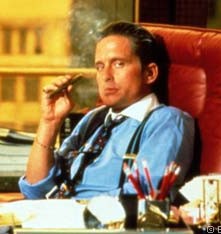The cost of naked greed
Gordon Gecko's "Greed is good" culture in the banking system is costing lives whilst corporate financiers fail to answer the most obvious and basic of questions.
by Watchman
Gordon Gecko - "Greed is Good".
 WE bumped into him the other day while he was out walking the family pet. “Yes”, he is still involved in looking after the financial assets of one of our best-known High Street banks - but no longer as an accounts manager, rather as an employee of a security firm responsible for collecting cash from the bank’s branch offices. And when he sees the expression on the faces of his former colleagues, he is glad that he is out of it. WE bumped into him the other day while he was out walking the family pet. “Yes”, he is still involved in looking after the financial assets of one of our best-known High Street banks - but no longer as an accounts manager, rather as an employee of a security firm responsible for collecting cash from the bank’s branch offices. And when he sees the expression on the faces of his former colleagues, he is glad that he is out of it.
He left the bank over a decade ago - fed up with the changed environment which regarded employees as mere functionaries, and ‘targets’ as the be all and end all of a day‘s work and the absolute measure of his perceived worth. His area manager had left some years earlier. [I know the gentleman concerned: He is a Christian and he told me at the time that he ‘couldn’t stand having to function as a “money salesman’”.]
Did no one see it coming?
So there is a ‘history’ behind the question that the Queen posed the other day to the financial gurus at the London School of Economics. Why was it, the monarch asked, that no-one saw that credit crash coming? Why indeed? But of course the answer is that some, many even, did; and not least my dog-walking friend and his former boss.
Regarding the underlying causes and the actions of the banks, one financial wizard and former employee of several high street ‘names’ recently said of his erstwhile colleagues in the wold of banking: "They disregarded the risks to go for aggressive growth," he said. "The City set them targets and put them on the treadmill to their big fat bonuses. The folly of it was obvious at the time to many bankers. But those who put their foot on the brake were told to move aside because they were old-fashioned."
And with that view my friend heartily concurred. But by this time the dog was getting bored with our conversation, so our dissection of global economics needed to end. With the lead tugging, he (the man, not the dog) summed up the dynamic underlying the current chaos in one word. “Greed”, he said from over his shoulder as we went our separate ways.
The cost in human lives
And it has been this greed that has pushed ‘easy money’ at us all; and not least at those who could not really afford it. Faced with the constant “go on, spoil yourself” pressures from a pervasive and powerful advertising industry pushing the retailers’ wares, many have succumbed to the temptation. And very sadly some have not survived.
In a recent analysis of the current financial plight one columnist for the Independent wrote about a woman, Jeanette Leigh. Aged just 31, she recently got off the plane at Manchester Airport following a holiday in Tenerife and received a text message saying her home had been repossessed. She went straight into the toilets at Terminal Two and hanged herself with the cord from her tracksuit bottoms. What a tragedy. And the question arises: “Who lend her the money to go on holiday when her home was on the line?” Could it have been one and the same outfit?
No wonder that the prophets’ warnings of yesteryear need to be broadcast loudly in our day. How many more Jeanette Leighs will there be before someone calls a halt to the “Greed is good” culture. And how many more straightforward questions will our Queen have to ask before she receives an honest reply?
In a reversal of roles it was the monarch who has exposed the financiers and corporate chiefs in their “Emperor’s new clothes”. It will take more than a fig leaf or bank note to cover their nakedness; and tragically any resolution will come much too late for Jeanette Leigh.
Ed postcript: Jan 2009
German billionaire Adolf Merckle committed suicide by throwing himself under a train, “broken” as his business empire crumbled under a growing burden of debt, his family said.
The 74 year-old businessman was hit yesterday evening near his hometown of Blaubeuren, 44 miles southeast of Stuttgart, a police officer said in an interview. His body was found on the tracks at around 7:30 p.m. about 300 yards from his home and a suicide note had also been found.
“The dedicated family businessman was broken by his inability to handle the situation and he ended his own life,” his family said in a statement today. “The distress at his companies caused by the financial crisis and the resultant uncertainty of the last few weeks” contributed to his death, the family added. Read full story at Bloomberg.com
|